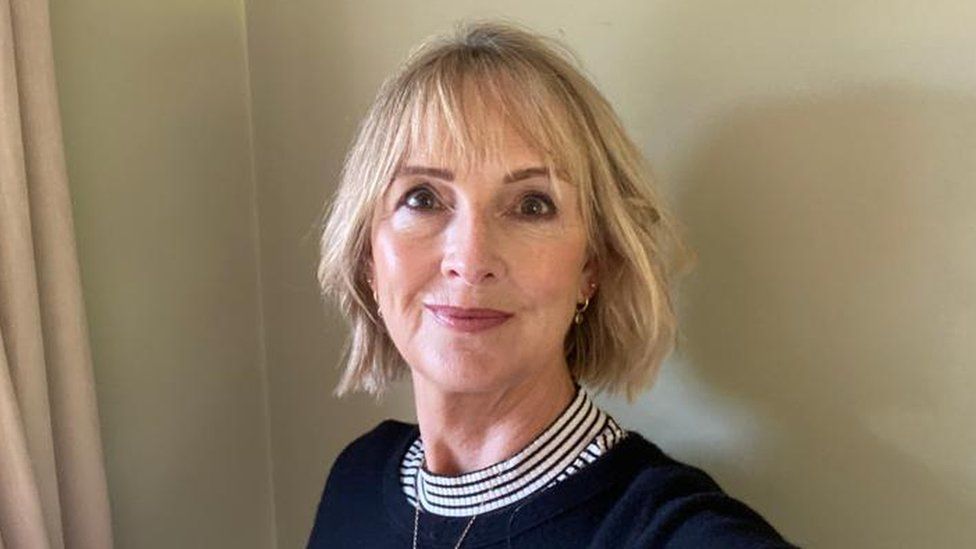
Pamela Redmond was diagnosed with bowel cancer in an emergency department
By Marie-Louise Connolly
BBC News NI health correspondent
Pamela Redmond lived with bloating, nausea and constipation for years.
In her 30s, she was diagnosed with irritable bowel syndrome, which meant eating a lot less to avoid vomiting and toilet problems.
A midwife who worked shifts, Pamela’s health deteriorated to the point she couldn’t digest a spoonful of cereal.
After many visits to the GP, hospitals and various tests, in 2020 she was diagnosed with stage three bowel cancer, aged 56.
Her diagnosis came after she was admitted to hospital via an emergency department.
‘I knew I had cancer’
Pamela believes that if she had been screened at 50, her tumour would have been picked up early, instead of being left to grow for six years.
“I knew I had cancer – I could feel something hard on my side – as usual they thought it was a gynae problem,” she said.
The County Down woman is telling her story as part of Bowel Cancer UK’s campaign calling for earlier screening in Northern Ireland.
On Monday, patients and doctors will join Bowel Cancer UK at Stormont to call for decisions to be made on the budget so that a cancer strategy can be implemented.
A giant inflatable bowel will be on site to help visualise the various stages of bowel cancer and encourage the public to be more aware of symptoms.
Pamela said the campaign’s slogan “right diagnosis at the right age and the right place” is apt.
“I should have been diagnosed earlier and certainly not in an emergency department,” she said.
Image source, Getty Images
The screening programme for bowel cancer in Northern Ireland lags behind the rest of the UK
Screening ages vary across across the UK:
- Northern Ireland: 60 – 74
- England: 56 – 74
- Scotland: 50 – 74
- Wales: 51 – 74
The local screening programme lags behind the rest of the UK as people are waiting longer to be tested.
In the Republic of Ireland, bowel cancer screening is offered to those aged 59 to 69 and who are on the bowel screening register. The first home screening test is offered between a person’s 59th and 61st birthday; then you are offered a home test every two years.
Almost nine in 10 people living in Northern Ireland with bowel cancer symptoms wait longer than the 62-day target for tests that can diagnose the disease.
From January to June 2023, only 61 out of 349 (17.4%) bowel cancer patients began treatment within 62 days of any urgent referral.
Pamela was diagnosed with a grade three tumour in 2020 after going to an ED and being admitted to hospital.
“When I asked the doctor if he knew my history he said, ‘what history?’, and shrugged as if it was irrelevant,” she said.
She recalled waking at 03:00 with an awful meaty taste in her mouth.
Then her bowel contents came out of her mouth, something known as faeculent vomiting.
‘Truly distressing’
“It was truly distressing but I do know that this is the point I finally felt I was noticed,” she said.
From that point on, everything went into fast forward, including getting a CT scan.
“Just as I arrived back to my room, a doctor arrived looking very panicked and announced I had a large tumour and would need surgery immediately,” Pamela said.
The next day, a surgical team removed 25 lymph nodes and part of her transverse colon.
Chris Robinson went privately to get checked more quickly
Chris Robinson, from Carrickfergus, County Antrim, is also a bowel cancer survivor who knew there was something drastically wrong.
He said he had toilet problems and found it difficult to get diagnosed, so to be seen quicker he went private.
“I’m not a fan of using private healthcare over the NHS, but I knew I had to get checked ASAP,” he said.
“I arranged an appointment and saw a consultant within four days.”
Second biggest killer
Bowel cancer is the second biggest cancer killer in Northern Ireland. About 460 people in Northern Ireland die each year from the disease.
Bowel Cancer UK says that when diagnosed at its earliest stage, 91% of people with bowel cancer will survive the disease for five years or more, compared with 13% of people when the disease is diagnosed at the latest stage.
Genevieve Edwards, chief executive of Bowel Cancer UK, said patients and their loved ones are paying a heavy price as they are more likely to wait longer for diagnosis and treatment.
The charity said a lack of political leadership at Stormont was contributing to these issues and it was demanding a properly funded NI Cancer Strategy, and for early bowel cancer diagnosis to be prioritised.








